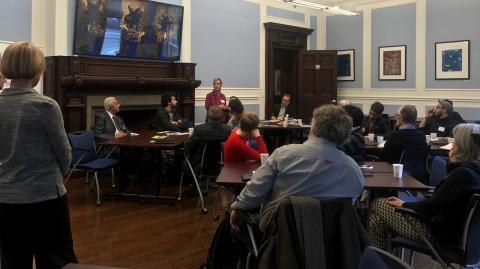CIRCLE: Innovation through Research in Interfaith Dialogue

Where is interfaith conversation in Canada today and what does it need to make it a more impactful part of society?
These are some of the questions that shaped a meeting of interfaith community representatives on April 5th. The group met around a proposal for the Canadian Interfaith Relations Centre for Learning and Engagement (CIRCLE), a new research body within the interfaith community, and discussed how such a body might benefit the kinds of conversations already happening across Canada. Rather than imposing pre-determined goals onto interfaith communities, the meeting’s facilitators asked participants to consider what the needs of the interfaith community in Canada might be and how CIRCLE might address those needs through community-based research.
Community-based research takes the concerns voiced by communities to be the guiding principle of subsequent academic research undertaken in collaboration with and in service to that same community. It leads the community to act together with a renewed sense of direction. With these parameters in mind, the meeting’s participants discussed some interfaith concerns from their various communities.
Discussions brought forward many working ideas of how interfaith dialogue impacts communities and how it might need to have a greater or different kind of impact. Amid the number of approaches came the challenge to see how all nonetheless shared in the interfaith project. Additionally, while talking together is an absolutely necessary aspect of what interfaith dialogue does at its best, and much healing and understanding comes through speaking and listening, doing and being together also speak in their own ways and face communities with different challenges and needs.
What might these needs be? And why develop a group like CIRCLE to address them? There seems to be a need for a kind of shared language among interfaith communities, and there is certainly a need to make the conversations these communities have worked so hard to have in the first place more readily available to the interfaith community both now and in the future. Furthermore, while the ways we do interfaith dialogue differ widely and beautifully, it seems worthwhile to consider more deeply how we might develop and articulate shared standards and practices of dialogue, since a guiding principle of interfaith relations is enabling various kinds of coming together in difference. How, then, might we better enable ourselves to see goals and values held in common between diverse approaches and motives?
CIRCLE recognizes these as some of the live questions currently facing interfaith communities in Canada. The discussions begun in this meeting are worth thorough and ongoing research as to how they could reveal guiding principles for what might best benefit the interfaith conversation on the ground. The hope is that this kind of research will in turn enable communities to continue to learn about and engage with each other.
Danielle Yett
10 April 2018

